
Czechoslovakia was a landlocked state in Central Europe, created in 1918, when it declared its independence from Austria-Hungary. In 1938, after the Munich Agreement, the Sudetenland became part of Nazi Germany, while the country lost further territories to Hungary and Poland. Between 1939 and 1945, the state ceased to exist, as Slovakia proclaimed its independence and Carpathian Ruthenia became part of Hungary, while the German Protectorate of Bohemia and Moravia was proclaimed in the remainder of the Czech Lands. In 1939, after the outbreak of World War II, former Czechoslovak President Edvard Beneš formed a government-in-exile and sought recognition from the Allies.

Ninotchka is a 1939 American romantic comedy film made for Metro-Goldwyn-Mayer by producer and director Ernst Lubitsch and starring Greta Garbo and Melvyn Douglas. It was written by Billy Wilder, Charles Brackett, and Walter Reisch, based on a story by Melchior Lengyel. Ninotchka marked the first comedy role for Garbo, and her penultimate film; she received her third and final Academy Award nomination for Best Actress. In 1990, Ninotchka was selected for preservation in the United States National Film Registry by the Library of Congress as being "culturally, historically, or aesthetically significant". In 2011, Time also included the film on the magazine's list of "All-Time 100 Movies".

The Munich Agreement was an agreement reached in Munich on 30 September 1938, by Nazi Germany, the United Kingdom, the French Republic, and Fascist Italy. The agreement provided for the German annexation of part of Czechoslovakia called the Sudetenland, where more than three million people, mainly ethnic Germans, lived. The pact is also known in some areas as the Munich Betrayal, because of a previous 1924 alliance agreement and a 1925 military pact between France and the Czechoslovak Republic.

Don Ameche was an American actor, comedian and vaudevillian. After playing in college shows, repertory theatre, and vaudeville, he became a major radio star in the early 1930s, which led to the offer of a movie contract from 20th Century Fox in 1935.
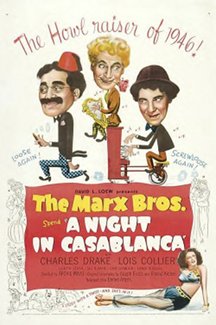
A Night in Casablanca is a 1946 American comedy film directed by Archie Mayo and starring the Marx Brothers. The screenplay was written by Joseph Fields and Roland Kibbee. It was an independent production released by United Artists. The cast also features actress and singer Lisette Verea. The villain is portrayed by Sig Ruman, who had roles in the earlier Marx Brothers films A Night at the Opera (1935) and A Day at the Races (1937).

Moon Over Miami is a 1941 American musical comedy film directed by Walter Lang with Betty Grable and Don Ameche in leading roles and co-starring Robert Cummings, Carole Landis, Jack Haley and Charlotte Greenwood. It was adapted from the play by Stephen Powys. This was previously adapted into a 1938 film titled Three Blind Mice directed by William A. Seiter and starring Loretta Young, Joel McCrea and David Niven.
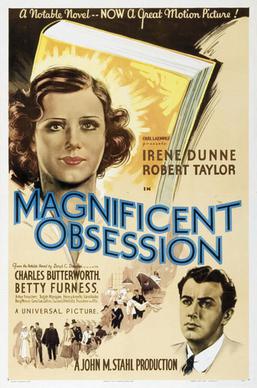
Magnificent Obsession is a 1935 drama film based on the 1929 novel of the same name by Lloyd C. Douglas. The film was adapted by Sarah Y. Mason, Victor Heerman, and George O'Neil, directed by John M. Stahl, and stars Irene Dunne, Robert Taylor, Charles Butterworth, and Betty Furness.
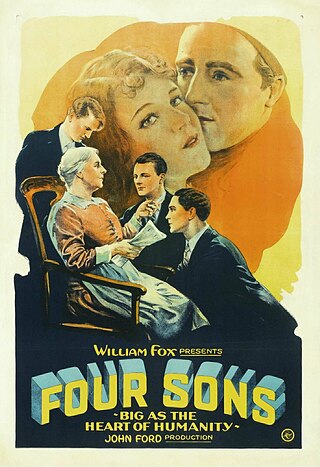
Four Sons is a 1928 American synchronized sound drama film directed and produced by John Ford and written for the screen by Philip Klein from a story by I. A. R. Wylie first published in the Saturday Evening Post as "Grandmother Bernle Learns Her Letters" (1926). While the film has no audible dialog, it was released with a synchronized musical score with sound effects using the sound-on-film movietone process.

Down Argentine Way is a 1940 American musical film made in Technicolor by Twentieth Century Fox. It made a star of Betty Grable in her first leading role for the studio although she had already appeared in 31 films, and it introduced American audiences to Carmen Miranda. It also starred Don Ameche, The Nicholas Brothers, Charlotte Greenwood, and J. Carrol Naish.
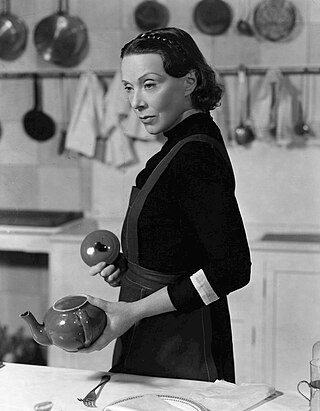
Eugenie Leontovich was a Russian-American actress with a distinguished career in theatre, film and television, as well as a dramatist and acting teacher.

That Night in Rio is a 1941 American Technicolor musical comedy film directed by Irving Cummings and starring Alice Faye, Don Ameche and Carmen Miranda. It was produced and distributed by Hollywood Twentieth Century Fox. It is one of several film adaptations of the 1934 play The Red Cat by Rudolf Lothar and Hans Adler. Others are Folies Bergère de Paris (1935) and On the Riviera (1951).

Something to Shout About is a 1943 Columbia Pictures musical film directed by Gregory Ratoff. The film stars Don Ameche and Janet Blair, and was nominated for two Academy Awards.

You Can't Have Everything is a 1937 Fox musical film directed by Norman Taurog and produced by Darryl F. Zanuck. The film stars Alice Faye and Don Ameche, and was the film debut for Gypsy Rose Lee credited as Louise Hovick part of her birth name.

Ramona is a 1936 American Drama Western film directed by Henry King, based on Helen Hunt Jackson's 1884 novel Ramona. This was the third adaptation of the film, and the first one with sound. It was the fourth American feature film using the new three strip Technicolor process. It starred Loretta Young and Don Ameche.
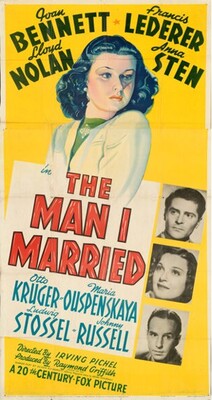
The Man I Married is an American 1940 drama film starring Joan Bennett, Francis Lederer, Lloyd Nolan and Anna Sten.

Confirm or Deny is a 1941 war drama film directed by Archie Mayo and starring Don Ameche, Joan Bennett and Roddy McDowall. It was produced and distributed by Hollywood studio 20th Century Fox. The screenplay was written by Jo Swerling, based on a story by Samuel Fuller and Henry Wales. An uncredited Fritz Lang worked on the film as director.

The Story of Alexander Graham Bell is a somewhat fictionalized 1939 biographical film of the famous inventor. It was filmed in black-and-white and released by Twentieth Century-Fox. The film stars Don Ameche as Bell and Loretta Young as Mabel, his wife, who contracted scarlet fever at an early age and became deaf.

The Three Musketeers is a 1939 musical comedy film adaptation of Alexandre Dumas's 1844 novel The Three Musketeers directed by Alan Dwan and starring Don Ameche as d'Artagnan, with the Ritz Brothers as his cowardly helpers. While the film can be found online, it did have an original copyright notice and renewal.

Folies Bergère de Paris is a 1935 American musical comedy film produced by Darryl Zanuck for 20th Century Films, directed by Roy Del Ruth and starring Maurice Chevalier, Merle Oberon and Ann Southern. At the 8th Academy Awards, the “Straw Hat” number, choreographed by Dave Gould, won the short-lived Academy Award for Best Dance Direction, sharing the honor with “I've Got a Feelin' You're Foolin'” from Broadway Melody of 1936. The film, based on the 1934 play The Red Cat by Rudolph Lothar and Hans Adler, is a story of mistaken identity, with Maurice Chevalier playing both a music-hall star and a business tycoon who resembles him. This was Chevalier’s last film in Hollywood for twenty years, and reprised familiar themes such as the straw hat and a rendering of the French song "Valentine". This is also the last film to be distributed by Twentieth Century Pictures before it merged with Fox Film in 1935 to form 20th Century Fox.
Slightly Used is a 1927 American synchronized sound comedy film directed by Archie Mayo and written by C. Graham Baker and Jack Jarmuth. While the film has no audible dialog, it was released with a synchronized musical score with sound effects using the Vitaphone sound-on-disc process. The film stars May McAvoy, Conrad Nagel, Robert Agnew, Audrey Ferris, Anders Randolf and Eugenie Besserer. The film was released by Warner Bros. on September 3, 1927.



















